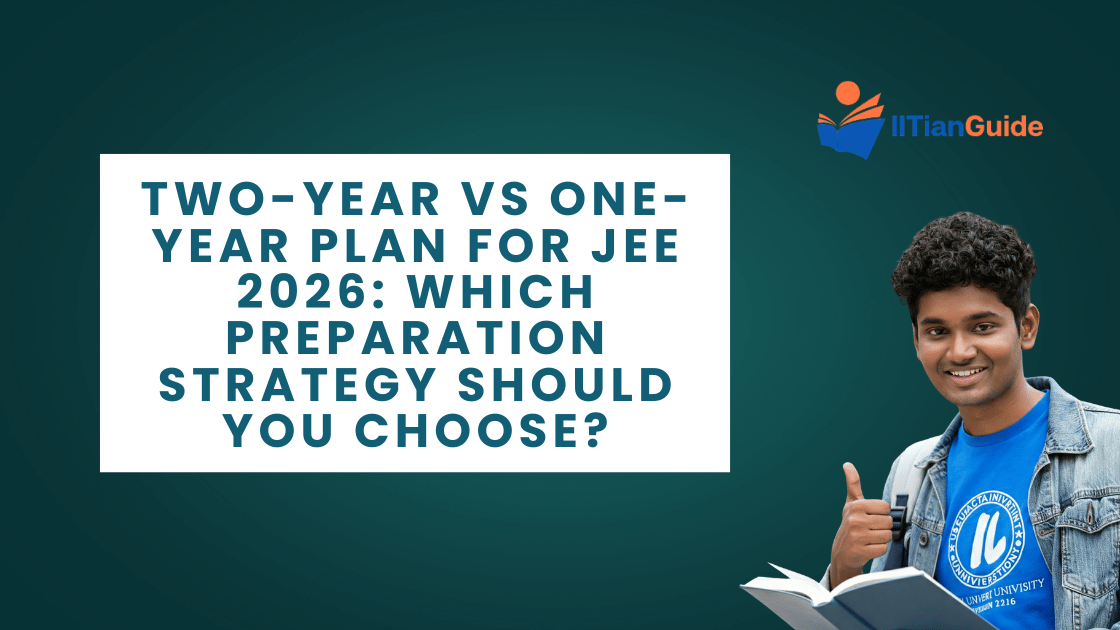Two-Year vs One-Year Plan for JEE 2026: Which Preparation Strategy Should You Choose

Preparing for the JEE 2026 exam is one of the biggest academic challenges for students aspiring to enter IITs, NITs, and IIITs. With intense competition and a vast syllabus, success depends not just on hard work but also on choosing the right preparation strategy.
The first decision every aspirant faces is whether to follow a two-year JEE preparation plan starting in Class 11 or a one-year JEE preparation plan in Class 12 or during a drop year. Both approaches can lead to success, but they are designed for different types of students.
In this detailed guide, we will compare two-year vs one-year JEE plans, explain their benefits and drawbacks, and provide study structures, timetables, and expert tips so that you can make the right decision for JEE 2026.
Why Planning Is Crucial for JEE 2026
The Joint Entrance Examination (JEE) is more than just another test—it is the gateway to IITs, NITs, IIITs, and top engineering colleges in India. Every year, over 10–12 lakh students attempt JEE Mains, while only a small percentage qualify for JEE Advanced. From those, even fewer secure seats in IITs.
The difference between success and failure often lies not in intelligence but in systematic preparation. Without a proper plan, even brilliant students can fall short. With a plan, even average students can excel. That’s why deciding between a two-year preparation strategy and a one-year focused plan is the first step for every aspirant and their parents.
Two-Year JEE Preparation Plan for 2026 (For Students Starting in Class 11)
The two-year JEE preparation plan is the most common route chosen by students who begin their journey in Class 11. It gives ample time to strengthen concepts, revise thoroughly, and practise regularly.
Structure of the Two-Year Plan
|
Year |
Focus Area |
Strategy |
|
Year 1 (Class 11) |
Foundation Building |
Start with NCERT Physics, Chemistry, and Maths. Focus on building strong basics. Learn to apply concepts to simple JEE-level problems. Avoid rushing through topics—spend time understanding. |
|
Year 2 (Class 12) |
Advanced Problem Solving + Revision |
Cover Class 12 syllabus while revising Class 11 topics side by side. Begin solving previous year JEE Mains and Advanced papers. Take mock tests regularly. Focus on accuracy and speed. |
Benefits of a Two-Year Plan
- Strong Foundation: Concepts are built gradually, making problem-solving easier in Class 12.
- Balanced Approach: Students can manage both board exams and JEE preparation without being overwhelmed.
- Ample Revision Time: With a longer timeline, aspirants can revise multiple times before the exam.
- Less Stress: Since the workload is spread out over two years, students don’t feel extreme pressure.
- Better Retention: Learning over two years ensures concepts stay fresh for the exam.
Challenges of a Two-Year Plan
- Consistency Required: Staying motivated for two years is difficult. Many students lose focus midway.
- Risk of Procrastination: Some students relax too much in Class 11 and pile up revision for Class 12.
- Overload During Class 12: If Class 11 is not utilised properly, Class 12 can become extremely stressful.
One-Year JEE Preparation Plan for 2026 (For Students Starting in Class 12 or During Drop Year)
The one-year JEE plan is for students who either start late in Class 12 or choose to drop a year after Class 12 to attempt JEE again. It is intensive, demanding, and requires strong discipline.
Structure of the One-Year Plan
|
Month Range |
Focus Area |
Strategy |
|
Months 1–4 |
Fast Syllabus Completion |
Cover NCERT and standard reference books quickly. Prioritise high-weightage topics like Electrostatics, Thermodynamics, Organic Chemistry, Calculus, and Coordinate Geometry. |
|
Months 5–8 |
Problem Solving + PYQs |
Begin chapter-wise question practice and solve previous years’ JEE Mains and Advanced papers. Strengthen weak areas identified in mock tests. |
|
Months 9–12 |
Revision + Mock Tests |
Revise entire syllabus multiple times. Take weekly full-length mock tests to simulate exam conditions. Focus on speed, accuracy, and exam temperament. |
Benefits of a One-Year Plan
- Focused and Intense: Perfect for students who decide late but are ready to give their full effort.
- Rank Improvement: Ideal for droppers who already know the basics and want to focus on advanced problem-solving.
- Efficient Preparation: Keeps students in an exam-oriented mindset throughout the year.
Challenges of a One-Year Plan
- Heavy Workload: Covering the entire JEE syllabus in one year can be overwhelming.
- High Stress Levels: Limited time means less flexibility for breaks or mistakes.
- Risk of Weak Fundamentals: If basics from Class 11 are weak, students may struggle to keep up.
How to Decide Between Two-Year and One-Year JEE Plan?
The choice depends on your academic position, mindset, and available time:
- Starting in Class 11? → Choose a two-year JEE plan for gradual, balanced preparation.
- Starting in Class 12? → Opt for a one-year plan with strict time discipline.
- Repeating after Class 12? → A one-year focused plan with more practice and less emphasis on basics is ideal.
Sample Daily Timetable for JEE 2026 Preparation
Two-Year Plan (Class 11 Start)
- 4–5 hours daily in Class 11, increasing to 6–8 hours daily in Class 12.
- Example:
- 6:00 AM – Wake up & quick revision
- 7:00–10:00 AM – Physics (Concept + Problems)
- 10:00–11:00 AM – Break
- 11:00–1:00 PM – Chemistry (NCERT + Practice)
- 2:00–4:00 PM – Maths (Concepts + Examples)
- 5:00–7:00 PM – Question solving from Class 11 topics
- 8:00–9:00 PM – Revision + Short notes
One-Year Plan (Class 12 Start or Drop Year)
- 8–10 hours daily with strict discipline.
- Example:
- 6:00–8:00 AM – Physics (High-weightage chapters)
- 8:00–10:00 AM – Maths problem solving
- 11:00–1:00 PM – Chemistry (Organic/Physical)
- 2:00–4:00 PM – Previous Year Questions
- 5:00–7:00 PM – Mock test/Timed practice
- 8:00–9:00 PM – Revision of weak topics
Expert Tips for JEE 2026 Aspirants
- Use NCERT as the foundation before moving to advanced books.
- Keep a chapter-wise formula sheet for quick revision.
- Solve JEE Main and Advanced PYQs
- Take at least one mock test every week in the last six months.
- Balance preparation with health, sleep, and stress management.
Conclusion
The two-year JEE plan offers time, balance, and depth—perfect for students starting in Class 11. The one-year JEE plan demands speed, focus, and discipline—best suited for Class 12 beginners or droppers.
No plan is inherently better; the right choice depends on when you start and how consistent you are. With the correct strategy, both approaches can lead to success in JEE 2026.
Frequently Asked Questions (FAQs)
- Which plan is better for JEE 2026: two years or one year?
If you start in Class 11, the two-year plan is better. If you start in Class 12 or take a drop year, the one-year plan is more practical.
- Can I crack JEE in just one year of preparation?
Yes. Many students have cracked JEE with a focused one-year plan by solving NCERT, PYQs, and mock tests consistently.
- How should I manage Class 12 boards with JEE preparation?
Use NCERT books, as they cover both boards and JEE basics. Align your study schedule so that board topics overlap with JEE topics.
- Which subjects should I prioritise in a one-year plan?
Focus first on high-weightage topics like Mechanics, Electricity & Magnetism, Thermodynamics, Organic Chemistry, Physical Chemistry, Algebra, and Calculus.
- How many hours should I study daily for JEE 2026?
- Two-year plan: 4–6 hours in Class 11, 6–8 hours in Class 12.
- One-year plan: 8–10 hours with strict discipline.

